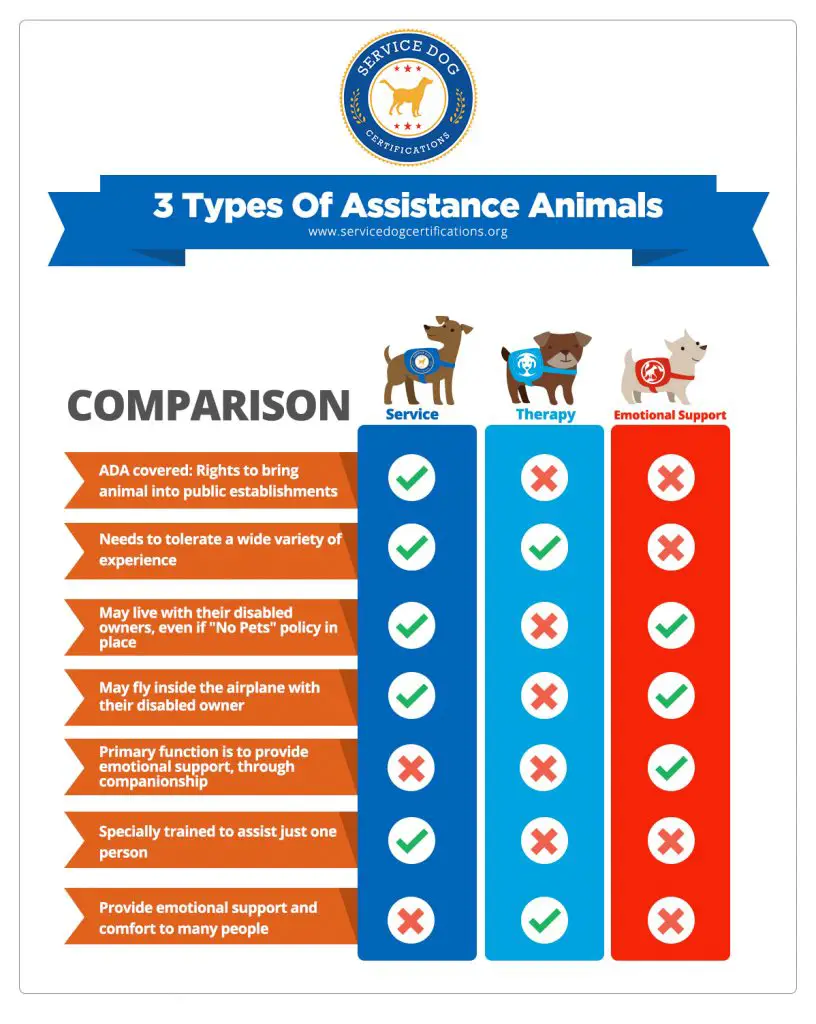There is no question that dog is man’s best friend. Dogs love unconditionally, often seeming to have a sense of exactly what we need. For dog lovers, the familiar jingling of a furry friend’s tags reminds us that we are not alone, and the smell of puppy breath represents all that is right with the world. A dog is a friendly face that greets us at the door at the end of every hard day, and something to invest in or to distract us from the things that are going wrong in life.
There are many ways that dogs help people. However, some help in a more formal way than others. Service Dogs, Therapy Dogs and Emotional Support Dogs are a few of the professional pups that help people get through our daily lives.

Service Dogs
When many people think of “therapy dogs” they are usually thinking of Service Dogs. Service Dogs are not pets. They are specially trained animals that do a specific task such as leading a blind person, pulling a wheelchair, or alerting a person with diabetes that their blood sugar is out of control. Service Dogs are often selected and trained from puppyhood for their specific job. The American Disabilities Act insures that people with disabilities can bring their Service Dog into places of public accommodation, just as they would any other assistive tool (wheelchairs, probing canes, etc).
No matter how much you love dogs, it is important to remember to leave a working dog alone. Even if they look awfully snuggly and you desperately want to tell them what a good boy they are, don’t. Distracting them from their job can be life threatening, even for a second. Instead, you can start a conversation with the owner
Registered Therapy Dogs
The simple presence of a Registered Therapy Dog on the floor of a hospital or nursing home can make people feel much more at ease. Children with dyslexia often benefit from reading to a Registered Therapy Dog since the dog doesn’t mind if they make mistakes. While any breed can become a Registered Therapy Dog, they must be well trained and love people. Registered Therapy Dogs are pets, that have learned to safely navigate hospitals, nursing homes, schools, and other public buildings. Some Registered Therapy Dogs entertain by doing tricks, while others simply offer a furry neck to cuddle. Still other Registered Therapy Dogs are used in therapeutic sessions to alleviate symptoms of alzheimer’s, adhd, and autism. Therapy Dog associations require vaccinations and a log of visits while providing training and support.
When students returned to Parkland, Florida’s Stoneman Douglas High School after the tragic shooting, they were greeted by a pack of precious therapy dogs, ready to offer comfort and even a hint of joy. (https://twistedsifter.com/2018/03/therapy-dogs-waiting-to-welcome-back-the-parkland-high-school-students/)
Emotional Support Dogs
Our furry friends offer us so much without asking for much in return. Emotional Support Dogs often don’t have any special training beyond the basics. Their owner has a special connection with them, and that alone is enough to help their owner handle anxiety inducing situations. These dogs are generally able to ride with their owners on airplanes, but do not have the same rights guaranteed to Service Dogs in other public spaces. A licensed mental health professional can prescribe a dog for a person that is in need of an Emotional Support Dog. There are no legal registration requirements for Emotional Support Dogs (don’t be fooled by scam sites that insist otherwise). The only legal requirement for an Emotional Support Dog is an official letter from a licensed mental health professional. This will allow you to have a pet in your home without an extra fee, even if there are no-pet policies in place. It also allows you to bring your pet into the cabin of an airplane with you. Emotional Support Dogs are not allowed to create a disturbance though, so basic training is important for these animals as well.
It is easy to love dogs. They do so much for us – just by existing.








